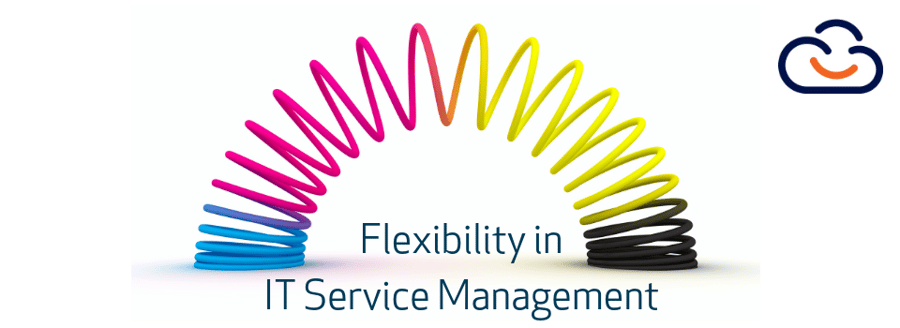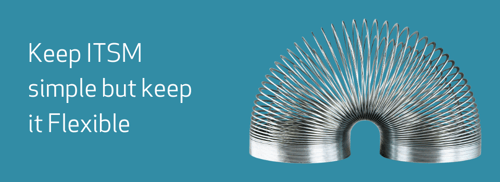Business technology is moving at an unprecedented rate. At the same time, IT infrastructure has become essential to the daily operations of nearly every business on the planet.
And, of course, those of us in the IT service management world are expected to keep pace. ITSM professionals must constantly adapt to changing requirements and increasingly complex environments while maintaining availability, meeting SLAs, and staying within budget.
With all this in mind, nobody would doubt that flexibility is of paramount importance when selecting an ITSM toolset.
But what exactly does it mean for an ITSM toolset to be flexible?
Flexibility in ITSM
At its most basic level, a flexible toolset is one that can be fully adapted and integrated with your specific business environment. No two IT services have precisely the same requirements, and in most cases working with an out-of-the-box solution simply isn’t going to be good enough.
Beyond this, however, there are three major considerations.
Consideration 1: Future Proofing
The first thing to consider when implementing an ITSM toolset is that requirements aren’t static… and neither are budgets. It’s all very well to implement a toolset that can do everything you need right now, but if it can’t be adapted to meet the changing needs of your business you’ll likely be in for a rough ride over the medium to long term.
At the same time, you need a toolset that can be easily scaled as your business grows. There are a number of factors here, from functionality to hosting options, and it’s vital that you take as many as possible into account when making your selection.
Consideration 2: Hosting Options
When it comes to hosting an ITSM toolset, there are three basic options:
- On premise
- Cloud / SaaS
- Hybrid
There are quite a few myths surrounding hosting options (we’ve covered some of them before) but ultimately it comes down to this: There is no “best” hosting option for ITSM toolsets.
There are significant benefits to each of the major hosting options, and each organisation must make their own decision about which is the best fit for their needs and resources, both now and in the future.
For instance, do your business requirements change frequently, necessitating the added control associated with an on premise solution – assuming you have in-house resources available? Or is your organisation growing rapidly, making an easily-scalable SaaS approach more appropriate for the time being?
Whatever your situation, once you’ve made a decision about how your ITSM toolset should be hosted you need to identify a toolset provider who can accommodate your needs.
Consideration 3: Security & Legal Requirements
Security is a hot topic right now, and major legislative changes such as the GDPR are forcing organisations to think very carefully about how they structure and utilise IT.
Once again, flexibility in an ITSM toolset is essential to ensure continued security and compliance in the face of a rapidly changing external environment.
And we’re not just talking about flexibility in the way your toolset is hosted. Considerations such as user access levels, database structure and integrity, and records management are all essential to the security and compliance of your organization, and the toolset you choose must have the flexibility to remain current in these areas.
Case Studies: A Flexible ITSM Toolset in Action
To help emphasise the importance of flexibility in an ITSM toolset, we’ll take a quick look at three common business scenarios.
1) Supporting Business Growth
Business growth is one of the most common pressures on an ITSM toolset. Everything might be ticking along just fine when a toolset is first implemented, but if it can’t be easily scaled to accommodate additional users, locations, and services, there will be problems eventually.
2) Adapting to Rapidly Changing Requirements
There are plenty of industries where IT requirements evolve rapidly… but few organisations require flexibility in IT delivery more than universities. With over 23,500 hardware and software assets, plus a plethora of devices owned by their 30,000+ students and faculty members, Plymouth University needed a scalable ITSM toolset with the flexibility to add and amend IT services as needed.
“In Higher Education there needs to be flexibility and the capability to change something quickly to keep up with student demands. We didn’t want to be constrained by a software supplier that doesn’t let you make changes when we need to. Sunrise gave us this freedom.” — Alice Trethewey,
Service Improvement Manager at Plymouth University
Read the full case study here.
3) The Ultimate Flexibility Test: Managed Service Providers
Managed service providers are without a doubt the single greatest test of ITSM toolset flexibility.
Why? Because when you’re providing external customer support, you can’t simply provide a one-size-fits-all service — you must be able to adapt your software to meet each customer’s needs.
MSPs have to be able to cope with a full range of service contracts, hierarchies, billing structures, multi-level SLAs, and TPAs… and they need to be able to report on everything at the touch of a button.
ANS Group specialises in providing managed compute, storage and network infrastructures, built on-premise or provided as a cloud based solution in its data centres. With over 600 customers spread across the public and private sectors they needed all of this functionality, and they also wanted a toolset that made life easy for their end users.
Scott Fletcher, Chairman and Founder of ANS Group explained; “We chose Sunrise because we liked the flexibility of the solution, based on the ITIL framework. The account team at Sunrise really understood what we wanted to achieve to support our business processes.
“We looked at a lot of different solutions and liked the fact that Sunrise is a UK company with an established business and their flexible approach meant that we can work with them as partners.” Read the full case study here.
What Do You Need From an ITSM Toolset?
There’s a lot to think about when you’re selecting an ITSM toolset. No matter what you need right now, things will always change in time, and new requirements will inevitably rear their heads.
By implementing an ITSM toolset that has the flexibility to cope with your changing business requirements, you can protect your organisation in the long term.
If you have any questions, or you’d like to talk through your options or requirements, we’d love to hear from you.
To speak with one of our ITSM experts, or to book a demo, visit our Contact Sunrise page.




.png)
